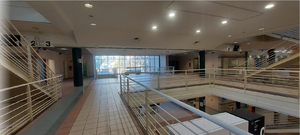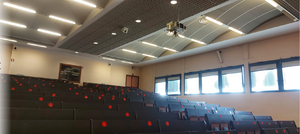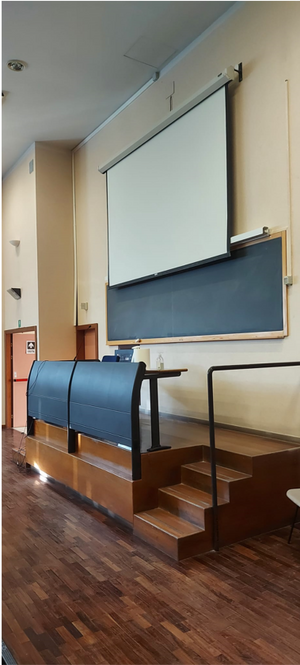State of the Map 2022/Call for venues/Florence
Welcome to the bid proposal page to host State of the Map 2022 in Florence, Italy
Team
How many group members does the team have?
- Alessandro Palmas
- Alessandro Sarretta
- Anisa Kuci (Wikimedia Italia)
- Cristiano Giovando
- Federica Gaspari
- Lorenzo Stucchi
- Luca Delucchi
- Lucia Argento
- Marco Brancolini
- Marco Minghini
- Martin Koppenhöfer
- Rosa Colacicco
The organization of SotM 2022 will be led by Wikimedia Italia (the Italian Local Chapter OpenStreetMap).
Wikimedia Italia is an association promoting free knowledge and free culture on a national scale since 2005. The organization is the official Italian chapter of Wikimedia Foundation, the US Foundation known around the world for Wikipedia, the free online encyclopedia.
Wikimedia Italia is also the Italian chapter of the OpenStreetMap Foundation since 2016.
We are definitely ready to host again State of the Map in Italy!
How are the team and the group members connected to OpenStreetMap?
All the team members are longstanding OpenStreetMap contributors and are very well-known within the Italian communities of geospatial free and open source software and open data, including the OpenStreetMap community. Most of them are members of the OpenStreetMap Foundation (OSMF).
Alessandro Palmas is a long-term OpenStreetMap contributor, currently working for the United Nations, he is the former Project Manager for OpenStreetMap at Wikimedia Italia, the Italian OSM Local Chapter.
Alessandro Sarretta is a long-term OpenStreetMap contributor, advocate and researcher, former National OpenStreetMap Coordinator for Wikimedia Italia, member of the OSMF. He is currently a researcher at the Italian National Research Council, Research Institute for Hydro-Geological Protection (CNR-IRPI).
Anisa Kuci works as OpenStreetMap Project Manager for Wikimedia Italia, the Italian local chapter of the OSMF. She is a member of the OpenStreetMap Foundation, part of the Local Chapters and Communities Working Group (LCCWG) of the OSMF. She is part of the FOSS4G 2022 Local Organizing Committee and also a member of cOSMopolIT.
Cristiano Giovando is a technical project manager for the Humanitarian OpenStreetMap Team (HOT), voting Member of HOT, and member of OSMF since 2008.
Federica Gaspari is part of the State of the Map Working Group of the OpenStreetMap Foundation (OSMF) since 2021 and co-founder and member of PoliMappers, the YouthMappers Local Chapter based at Politecnico di Milano. She is an OSMF member since 2020 through the active contributor program and also a member of cOSMopolIT.
Lorenzo Stucchi is the National OpenStreetMap Coordinator for Wikimedia Italia, co-founder and member of PoliMappers since 2016 and member of the OSMF since 2018.
Luca Delucchi is a long-term OpenStreetMap contributor and advocate, board member of GFOSS.it, the Italian local chapter of the Open Source Geospatial Foundation (OSGeo), and the Chair of FOSS4G 2022 that will be held in Florence, Italy.
Lucia Argento is a long-term OpenStreetMap contributor, member of Wikimedia Italia since 2021, currently working as GIS Analyst for private and public companies. She is also a member of cOSMopolIT.
Marco Brancolini is a long-term OpenStreetMap contributor, currently working for the United Nations; he is a Voting Member of the Humanitarian OpenStreetMap Team (HOT), and he was (2017-2019) the local OpenStreetMap coordinator for Piedmont region at Wikimedia Italia, the Italian OSM Local Chapter.
Marco Minghini, currently working at the Joint Research Centre (JRC) of the European Commission, is part of the SotM WG of the OSMF since 2018. He is a Voting Member of the Humanitarian OpenStreetMap Team (HOT) since 2017. He is a long-term OpenStreetMap contributor, advocate, trainer and researcher (see his OSM wiki page) and he has been a member of the OSMF since 2017. He co-founded PoliMappers, the YouthMappers Local Chapter based at Politecnico di Milano, in 2016.
Martin Koppenhöfer is a long-term OpenStreetMap contributor in the Italian and German community and member of the OSMF since 2010.
Rosa Colacicco is a Wikimedia Italia member since 2021 and regional OpenStreetMap coordinator for Wikimedia Italia, she has a degree in Geological Sciences and Technologies and is currently a currently a PhD student in Geosciences at the Department of Earth Sciences and Geoenvironmental of the University of Bari. She is involved in Earth observation monitoring and remote sensing, with particular attention to the monitoring of flood events. President and co-founder of YouthMappers@Uniba, she is also part of the cOSMopolIT group.
Marco Minghini and Alessandro Palmas were part of the core organizing team of State of the Map 2018 in Milan, while Federica Gaspari, Lorenzo Stucchi and Marco Brancolini have helped out as volunteers during the whole duration of the event.
Do some group members have experience in organizing a larger conference?
The team has an outstanding experience in organising conferences, including large conferences both at a national and international level. Part of the team is currently organizing the FOSS4G 2022 conference that will take place during the same week in Florence (expected audience: 1000 people). Many people of the team are also the organizers of the annual FOSS4G-IT conference, i.e. the national edition of FOSS4G, which is a joint event including the former events GFOSSDAY (focused on free and open source geospatial software) and OSMit (focused on OpenStreetMap) - with an average number of 300 attendees. Alessandro Palmas and Marco Minghini were part of the core team organizing SotM 2018 in Milan (about 450 attendees). Marco Minghini has been part of the SotM WG since 2018 and he is the main organiser and co-chair of the Academic Track since then. Marco Minghini was also the Secretary and main organizer of FOSS4G Europe 2015 (with about 450 attendees), held in Como (Italy). Federica Gaspari has been part of the SotM WG since 2020 and helped to organize the online SotM 2021. Anisa Kuci has co-organized OSCAL (Open Source Conference Albania) for several editions (average number of attendees: 300). Cristiano Giovando contributed to the organization of HOT Summits and the first State of the Map Africa conference in 2017. Luca Delucchi organized several OSMit (the Italian OSM conference) and GFOSSDAY (the Italian FOSS4G conference) conferences. He was also part of some international FOSS4G conferences as code sprint organizer, and will be the Chair of FOSS4G 2022.
Bid/wiki form
Is the form fully filled out?
No
The form presents two different proposals (A and B). The venue of the first proposal is the Università degli Studi di Firenze, the university in Florence. The venue in proposal B is the Fiera Congressi, the same venue as the FOSS4G 2022.
Venue B is very close to the city center and to the train station, while Venue A is outside the city center but well connected with tramlines and buses.
The main difference between the two proposals is the location of the venues and the cost. The proposal presents and describes both the options and leaves to the SotM WG the final decision on which venue is more suitable.
We are verifying both venue proposals (costs and necessary spaces) and we will update the page with all the information as soon as we can.
City
What infrastructure does the place have?
The city of Florence is committed to preserving it's historic monuments through the reduction of traffic in the historical center and the creation of pedestrian-only zones.
Public transportation is not strictly needed in town, as everything is reachable within a walking distance. Since the streets and buildings are centuries old, moving around with physical disabilities may require some effort, but all the museums are accessible as well as the conference venues, more info at visitflorence.com.
The city has an efficient public transport network, with public transport being mainly served by buses. A comprehensive network of frequent bus routes covers the city from the historic center to the outskirts and all of the suburbs. A tramway line connects the city center (Santa Maria Novella railway station) with the Peretola airport and the university campus, both located north-west of the metropolitan area.
Is it a LGBT friendly space?
Thanks to the large flows of national and international tourists, and being one of the most important fashion centers in Italy, Florence is an open-minded, multicultural and international city and has no cultural restrictions of any kind. There is a rich and organized LGBT local community with many events organized every year. For more information and resources, see the municipality's website to find more information.
What about medical and travel safety?
The city of Florence has invested heavily in safety to guarantee its tourists (more than 5 million each year, see here) a peaceful stay and this makes Florence a city to enjoy day and night.
What about terrorism or crime?
The city of Florence is a safe place that could be visited without any restriction and risk.
Travel
How good is the place reachable internationally?
Firenze airport is very well connected with daily direct flights to all European hubs of the main airlines. The airport is well connected with the city center with a direct tram (see here). Florence is located in the heart of Italy and thanks to the Italian high-speed train links it can be easily reached from all the main Italian destinations and international airports, e.g. in 2 hours from Milan, 1.5 hours from Rome and only 40 minutes from Bologna.
Florence can also be reached in about an hour from the Pisa airport, a Ryanair hub with flights from most European cities.
What kind of visa restrictions are there?
Citizens from the Schengen area countries require only a national ID card or a passport to enter Italy. Citizens from the countries listed here do not need a visa to enter Italy as tourists for up to three months. Participants from other countries that require a visa, will be provided with an invitation letter from the conference organizing team.
Dates
Are there conflicts with other conferences (local SotM, Foss4G)
The conference will take place in the days immediately after or immediately before the FOSS4G 2022 conference, which will also happen in Florence from August 22 to 28, 2022. This will not only avoid overlaps, but it will also favour the participation of people from the geospatial open source and open data communities interested in joining both events.
The same team putting together this proposal is also working to bring the Humanitarian OpenStreetMap Team (HOT) Summit to Florence in the same period, ideally in the days immediately preceding or following SotM 2022.
There are also no conflicts with the Italian FOSS4G-IT conference (which is also focused on free and open source geospatial software and open geospatial data, including OSM), since FOSS4G-IT will not take place during 2022 exactly because the global FOSS4G and (hopefully) the global SotM conferences will happen in Italy. However special sessions in Italian language, e.g in the form of talks or simply breakout sessions, will still be planned in order to allow the Italian OSM community to meet and discuss relevant topics.
Funding (minor criterion)
Can we expect additional regional sponsors?
Yes, we identified Italian and European companies working with OpenStreetMap data that would be interested to sponsor the conference; see the sponsors of SotM 2018 for a possible list of interested companies, which included e.g. Immobiliare.it, the leading Italian real estate agency which makes strong use of OSM for their business.
Is there administrative support or other support?
Wikimedia Italia is an association of volunteers promoting open culture projects on a national scale since 2005. The organization is the official Italian chapter of Wikimedia Foundation; since 2016, it is also the Italian local chapter of the OpenStreetMap Foundation. Wikimedia Italia will provide administrative and organisational support to the event.
The GFOSS.it association (the Italian local chapter of the Open Source Geospatial Foundation - OSGeo) will be providing major support on organizing the event.
Other special features of the venue
Are there any other special features of the venue that we should consider?
COVID-19 considerations
The information you will find below reflects the current situation in Italy as of December 2021. Please note that the COVID-19 restrictions might change rapidly based on how the pandemic situation evolves.
Important information for all attendees: based on the current EU Regulation, the EU Digital COVID Certificate (released after vaccination or proof of having recovered from COVID-19 or been vaccinated) is mandatory in order to attend the event and all related activities and face masks should be kept in closed environments.
To travel to Italy there are different restrictions for different categories of countries. Updated and detailed information about the restrictions for specific categories can be found on the website of the Italian Ministry of Health.


